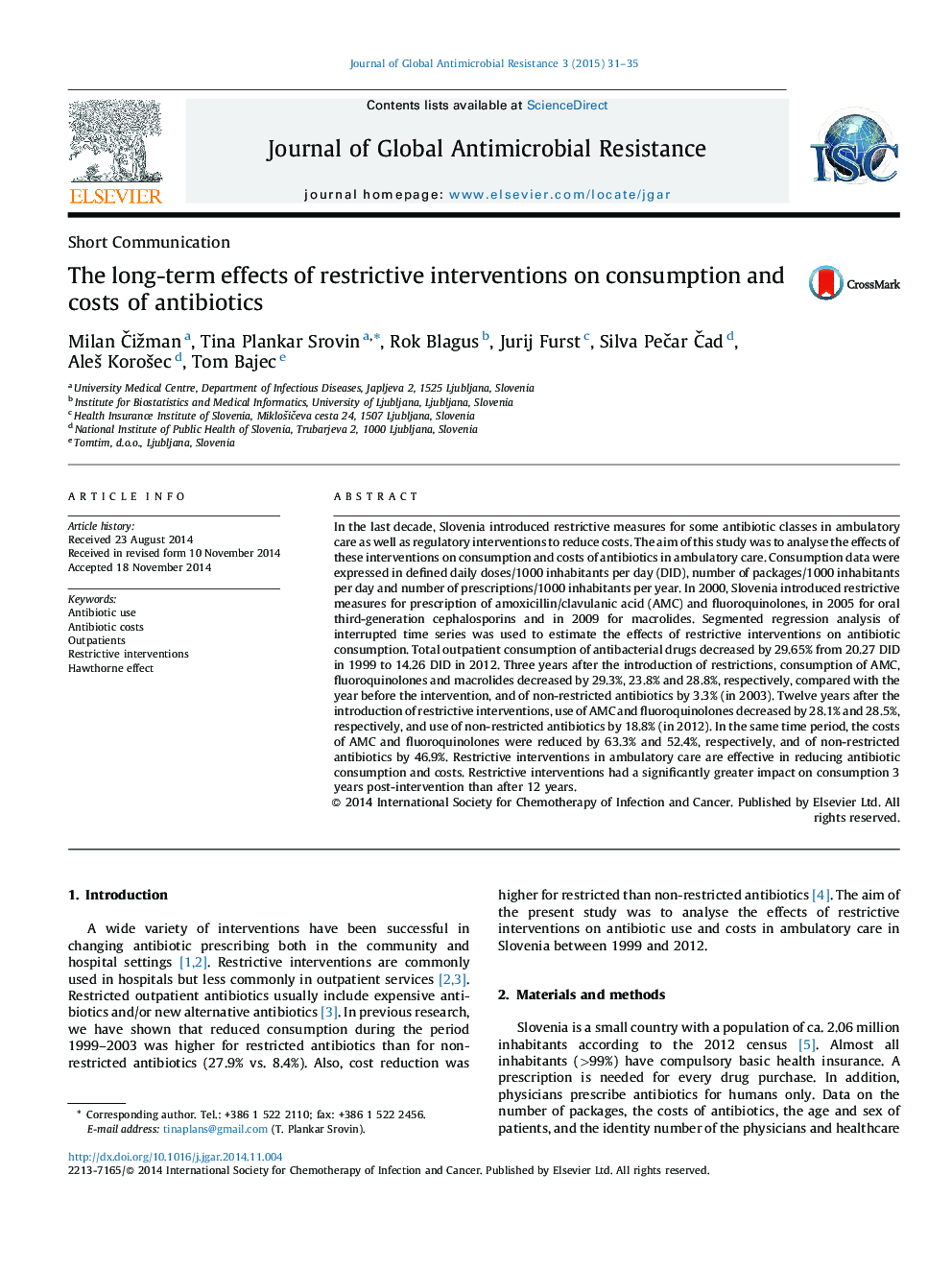| کد مقاله | کد نشریه | سال انتشار | مقاله انگلیسی | نسخه تمام متن |
|---|---|---|---|---|
| 10169965 | 1223478 | 2015 | 5 صفحه PDF | دانلود رایگان |
عنوان انگلیسی مقاله ISI
The long-term effects of restrictive interventions on consumption and costs of antibiotics
ترجمه فارسی عنوان
اثرات درازمدت مداخلات محدود کننده بر مصرف و هزینه های آنتی بیوتیک ها
دانلود مقاله + سفارش ترجمه
دانلود مقاله ISI انگلیسی
رایگان برای ایرانیان
کلمات کلیدی
استفاده از آنتی بیوتیک، هزینه آنتی بیوتیک، سرپایی مداخلات محدود، اثر هوتورن،
موضوعات مرتبط
علوم زیستی و بیوفناوری
ایمنی شناسی و میکروب شناسی
میکروبیولوژی و بیوتکنولوژی کاربردی
چکیده انگلیسی
In the last decade, Slovenia introduced restrictive measures for some antibiotic classes in ambulatory care as well as regulatory interventions to reduce costs. The aim of this study was to analyse the effects of these interventions on consumption and costs of antibiotics in ambulatory care. Consumption data were expressed in defined daily doses/1000 inhabitants per day (DID), number of packages/1000 inhabitants per day and number of prescriptions/1000 inhabitants per year. In 2000, Slovenia introduced restrictive measures for prescription of amoxicillin/clavulanic acid (AMC) and fluoroquinolones, in 2005 for oral third-generation cephalosporins and in 2009 for macrolides. Segmented regression analysis of interrupted time series was used to estimate the effects of restrictive interventions on antibiotic consumption. Total outpatient consumption of antibacterial drugs decreased by 29.65% from 20.27 DID in 1999 to 14.26 DID in 2012. Three years after the introduction of restrictions, consumption of AMC, fluoroquinolones and macrolides decreased by 29.3%, 23.8% and 28.8%, respectively, compared with the year before the intervention, and of non-restricted antibiotics by 3.3% (in 2003). Twelve years after the introduction of restrictive interventions, use of AMC and fluoroquinolones decreased by 28.1% and 28.5%, respectively, and use of non-restricted antibiotics by 18.8% (in 2012). In the same time period, the costs of AMC and fluoroquinolones were reduced by 63.3% and 52.4%, respectively, and of non-restricted antibiotics by 46.9%. Restrictive interventions in ambulatory care are effective in reducing antibiotic consumption and costs. Restrictive interventions had a significantly greater impact on consumption 3 years post-intervention than after 12 years.
ناشر
Database: Elsevier - ScienceDirect (ساینس دایرکت)
Journal: Journal of Global Antimicrobial Resistance - Volume 3, Issue 1, March 2015, Pages 31-35
Journal: Journal of Global Antimicrobial Resistance - Volume 3, Issue 1, March 2015, Pages 31-35
نویسندگان
Milan Äižman, Tina Plankar Srovin, Rok Blagus, Jurij Furst, Silva PeÄar Äad, AleÅ¡ KoroÅ¡ec, Tom Bajec,
